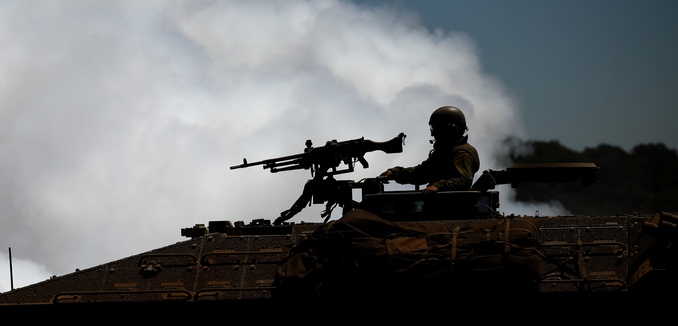Hezbollah’s military activities on the Syrian side of the Golan Heights is similar to what Israel observed prior to when Hezbollah launched the 2006 war, an IDF officer told Israel’s Channel 2 Wednesday.
Hezbollah is “obsessively” tracking and monitoring Israeli soldiers from across the border, Lt. Col. Eliav Elbaz said, “gathering [information] about everything happening here, everything our security forces [are doing].” Despite Hezbollah being what Elbaz described as “up to their necks” in supporting Syrian dictator Bashar-al Assad, the Iran-backed terror group’s activities are still “reminiscent of what they did before the Second Lebanon War.”
Elbaz’s observations come amid growing concern that Hezbollah is laying groundwork for a new war against Israel with improved capabilities over 2006, due its recent combat experience in support of Assad. This was backed up by a Voice of America report on Wednesday, which said that Hezbollah has developed new skills and capabilities in its efforts to prop up Assad, which could pose a challenge for Israel in the event of a war.
Aram Nerguizian, a Middle East analyst with the Center for Strategic and International Studies, told the VOA that “Hezbollah has become more proficient at mass force maneuvers and of tying together different battle groups,” including Iraqi militias and other Shiite militias consisting of Afghanis and Pakistanis. Hezbollah is also improving its logistical operations and learning to use more sophisticated equipment, artillery cover, and reconnaissance and surveillance drones more effectively. Furthermore, Hezbollah has deepened its military alliance with Iran. He added that Hezbollah “would like to maintain a stable footing in the Golan and leave troops there after the Syrian civil war is over.”
As Nerguizian observed, Iran and Hezbollah are also attempting to build up terror infrastructure along the Golan Heights. Matthew Levitt, director of the Stein Program on Counterterrorism and Intelligence at the Washington Institute for Near East Policy, explained to the VOA that Hezbollah has chosen to do so in Syria because “it is important for them to be able to open up a front from which they can do smaller things from time to time against Israel,” thereby maintaining their image as an anti-Israel resistance organization. Israel has indicated it will not allow Hezbollah and Iran to establish a foothold along the Golan Heights, and top Israeli officials have been insistent that a future agreement on Syria should not strengthen Iran and Hezbollah.
At a congressional hearing last week, Tamara Cofman Wittes, Director of the Center for Middle East Policy at the Brookings Institution, noted in her prepared testimony (.pdf) that the war in Syria has provided Hezbollah fighters with “extensive experience in conventional warfare, increasing their battle hardiness and capabilities” in a future confrontation with Israel.
IDF Deputy Chief of Staff Maj. Gen. Yair Golan warned last week that the next war Israel fights with Hezbollah in Lebanon will be a “full-scale war” that causes “devastating damage to Lebanon.” Hezbollah has stockpiled around 150,000 rockets and missiles, some with sophisticated guidance systems, and has placed its military infrastructure among Shiite villages in southern Lebanon, putting Lebanese civilians at risk and using them as a human shields. “There is no other way to take out this threat without…creating large damage to the Lebanese infrastructure, to Lebanese houses and other civilian facilities,” Golan stated.
An Israeli defense official told The New York Times last May that the buildup of Hezbollah’s terror infrastructure in southern Lebanese villages meant that “civilians are living in a military compound” and that their lives were at risk. A few days later, a newspaper linked to Hezbollah confirmed the Israeli assessment. There have been reports of Hezbollah offering reduced price housing to Shiite families who allowed the terrorist group to hide rocket launchers in their homes.
During a meeting with Hezbollah chief Hassan Nasrallah in August, Iranian Foreign Minister Mohammad Javad Zarif boasted that the nuclear deal presented “a historic opportunity” to confront Israel.
United Nations Security Council Resolution 1701, which was passed unanimously to end the 2006 war between Israel and Hezbollah, forbids the transfer of weaponry to Hezbollah. However, Iran has continued to arm Hezbollah and the Security Council has refused to act to enforce the resolution.
[Photo: Israel Defense Forces / Flickr ]




